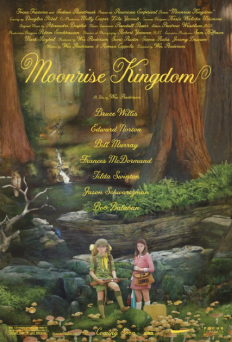By Michael Scoular (The Cascade) – Email
Print Edition: July 4, 2012
 Unfurling his love of intricate secrets and attention to familial pain again, it would be easy to say Moonrise Kingdom is just another Wes Anderson movie, doing the things that Wes Anderson movies are expected to do. While it does many of those favourite things, to deny the development, the things that separate his films—a similar level of detail in them all, but with attitudes changing, or as his characters all can be said to do, trying to change and grow—is to grossly belittle someone who is not becoming, but is to be looked up to, in American filmmaking.
Unfurling his love of intricate secrets and attention to familial pain again, it would be easy to say Moonrise Kingdom is just another Wes Anderson movie, doing the things that Wes Anderson movies are expected to do. While it does many of those favourite things, to deny the development, the things that separate his films—a similar level of detail in them all, but with attitudes changing, or as his characters all can be said to do, trying to change and grow—is to grossly belittle someone who is not becoming, but is to be looked up to, in American filmmaking.
Bottle Rocket aside, all of Anderson’s movies start with a guided tour, boxing in characters who want to categorize life through inventories and itineraries with perpendicular camera wheeling and timed-to-the-second entrance/exit choreography. For Moonrise Kingdom, it’s the two temporary residences on a group of islands, holding Sam (Jared Gilman) and Suzy (Kara Hayward), two friendless friends. His perfection in arrangement has outgrown the unloving world and she’s gained an understanding of how she’s perceived by everyone – to neither of their benefits. From the start, their flawless planning and the regimented style surrounding them suggests the familiar comforts of being in a homemade Wes Anderson picture, but the visual—malleable to fit documentary and fantasy, period and forever—possesses some of the attributes of a mask. It cannot account for, cannot stay tethered, in the midst of the unpredictable impulses of individuals, “disturbed” or considered otherwise. The crash of emotions is always seeping through Sam and Suzy’s cool exterior.
Perhaps the most revealing of comparisons is with Anderson’s Rushmore, for in addition to the change in Jason Schwartzman’s height, there is a growth outward from the sheltered view of the “cool in my head, even if not in yours” characters. Moonrise Kingdom is just as much, if not more concerned, with the effect on and responses of parents. Though absent parents have always hung around Anderson’s worlds, here they intersect in a way different from even the most grown-up focused of his works. If Gene Hackman in The Royal Tenenbaums, Bill Murray in The Life Aquatic, and George Clooney in Fantastic Mr. Fox tried to rejoin and catch up with children grown out of reach or comprehension with too little time and divided attention on their side, here the adult figures, Social Services aside, do so with the ability to access their experience of the same, if somewhat different from the children in their care. They can connect on an even surface, but with different registers of pain, unstoppably present and remembered, underneath. Anderson crosses from back to forth, picking up conversations and calamities, with the timeframe (the past) and portraiture (the hazy kind) leaving the film balancing and swiveling between learned story-weaving and idealized memory.
As the opening exegesis of creation and recreation lays out (and this is but one of the ways to look at it), Anderson’s specific tonal resonance is entirely dependent on their adoption by his collaborators, both familiar linemates (Bill Murray, Jason Schwartzman) and newcomers to the band (Edward Norton, Frances McDormand, Bruce Willis and all the scouts). Gilman and Hayward, camera holding in rapt close-up, capturing everything from their unexpectedly upsetting or creative urges, do not always have the safety net of self-aware humour as in Rushmore, and their determined assumed maturity carves out indelible moments where many have also tread – no easy task. And even if only on the basis of this and Fantastic Mr. Fox, perhaps especially because their work together started there, the collaboration of composer Alexandre Desplat and Anderson is one of the most important forces of enunciation in their filmic universe.
If there’s anything about Anderson that is completely the same, it is how Moonrise Kingdom holds references to and selections from films, music and anything else that touches common ground in sensibility, plot, or sometimes without any kind of obvious guiding reason for being. But to go through and list them, play the game of connecting the dots with nothing else in between, would be to do exactly the opposite of how Anderson views the incorporation of what has shaped his attitude into his own work. Where Pierrot le Fou’s back and forth reading of handwritten thoughts on love and escape is in Moonrise Kingdom, it is not simply transplanted, but becomes an outlet for the moments where the ideas for correspondence with someone, anyone, take root, in quick montage, jolting from evocations of sadness to mishaps and jokes and back again. Whether moving through the modes of silent or talking pictures, collaborating with actors established or new, Anderson’s pervasive expression of openness—hindered only by the words too often spoken that let no one in—exceeds the explanations provided by and accounts for every tangential shot influence. Whatever a reference, a common theme or a shared memory viewed outside of the film is, it has little bearing on what it will become in Moonrise Kingdom.


